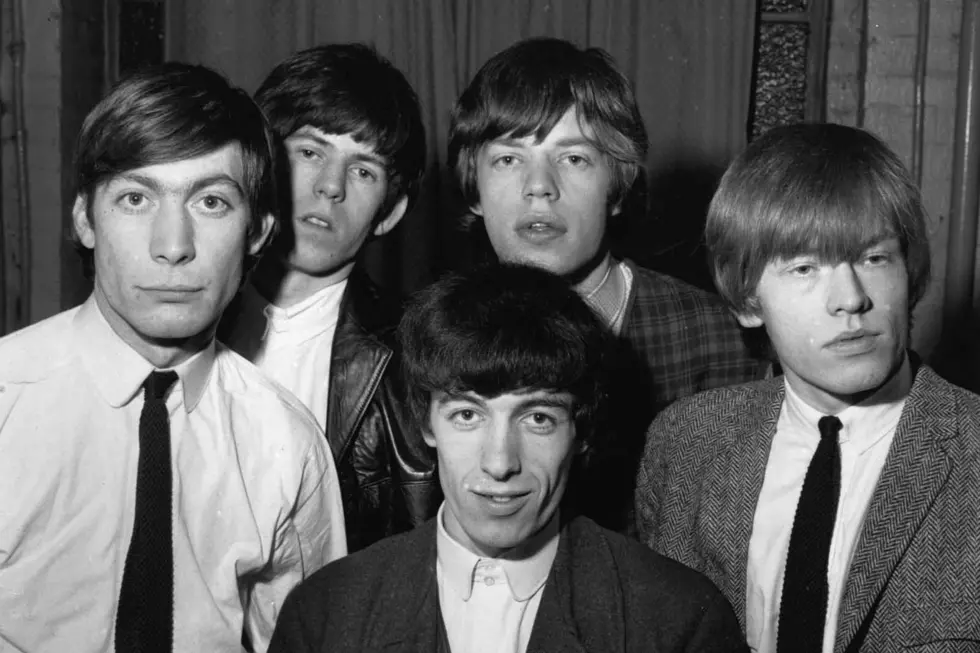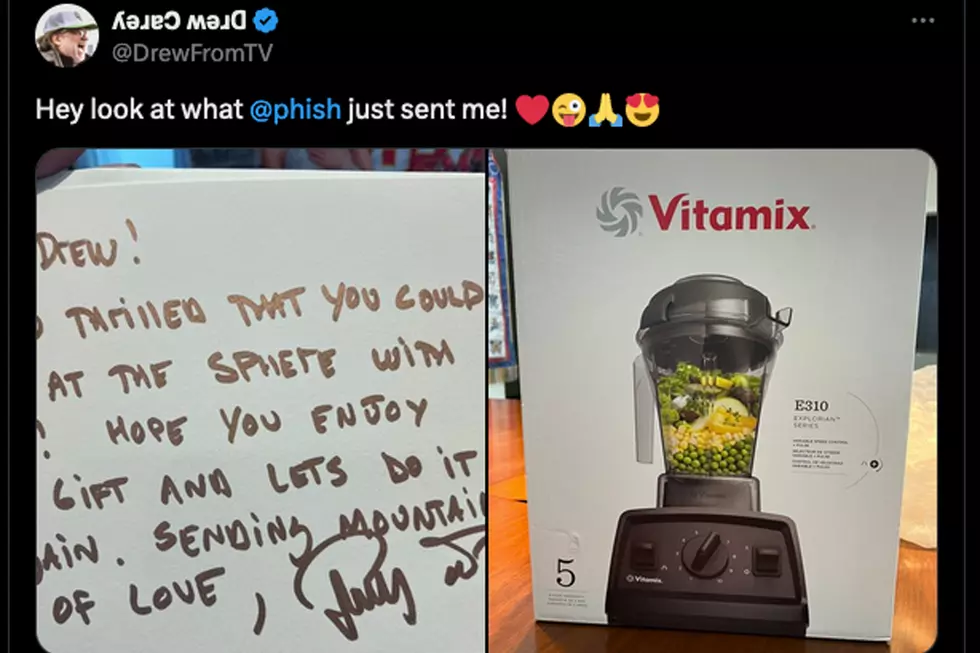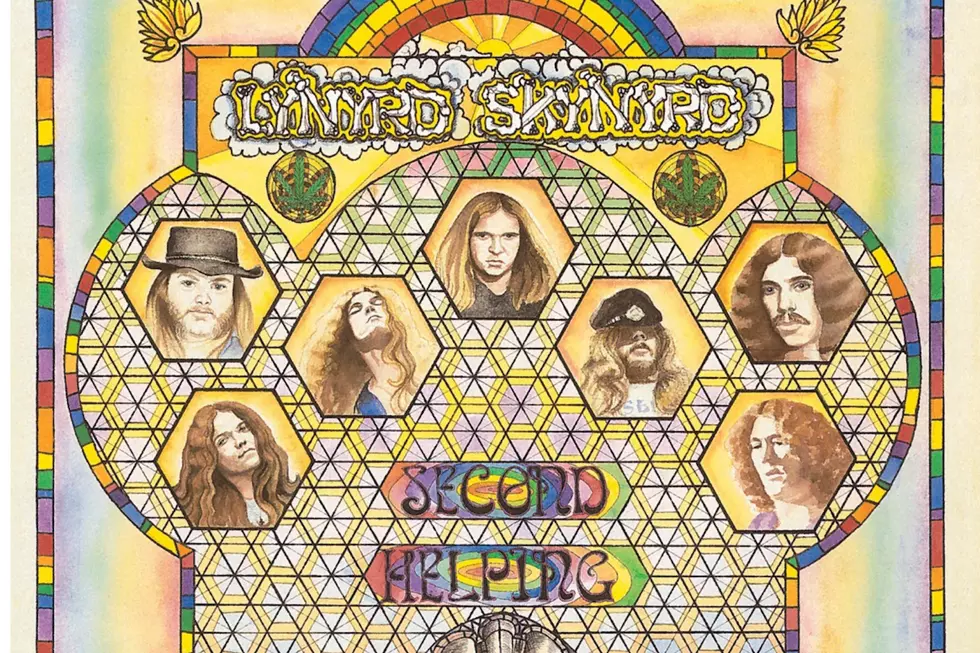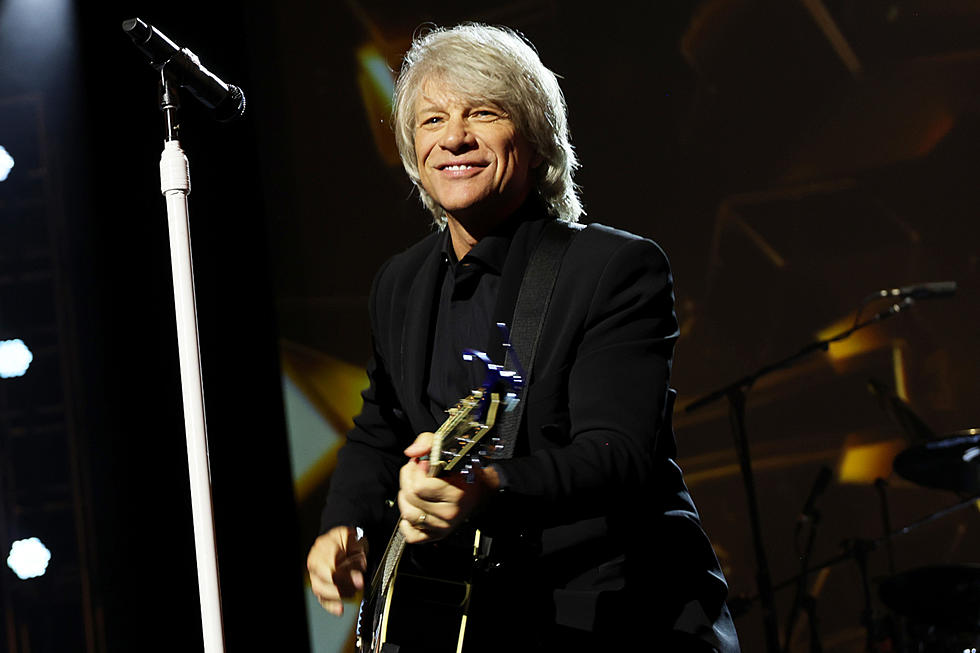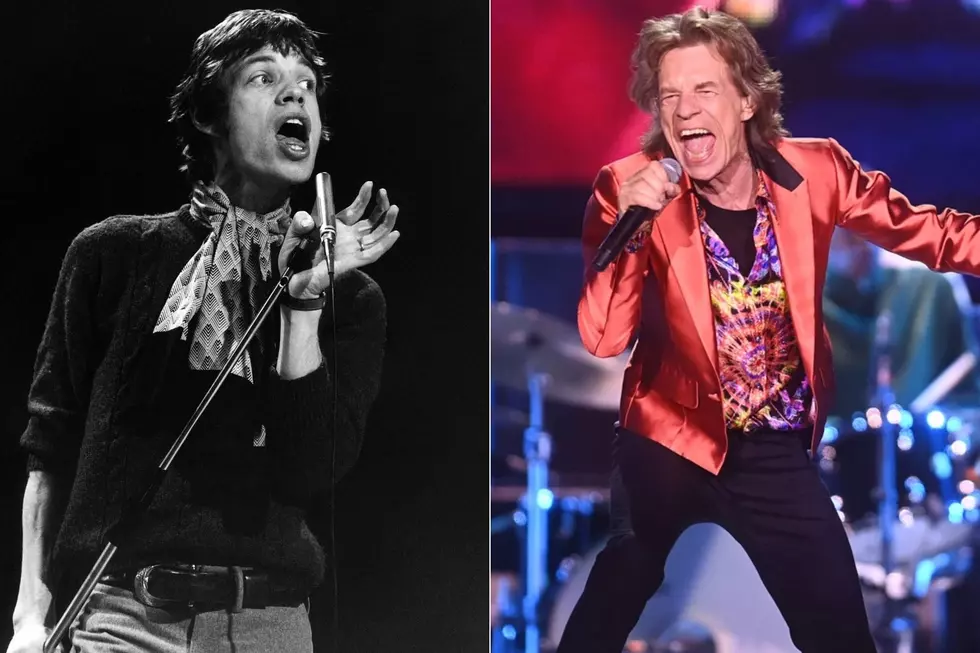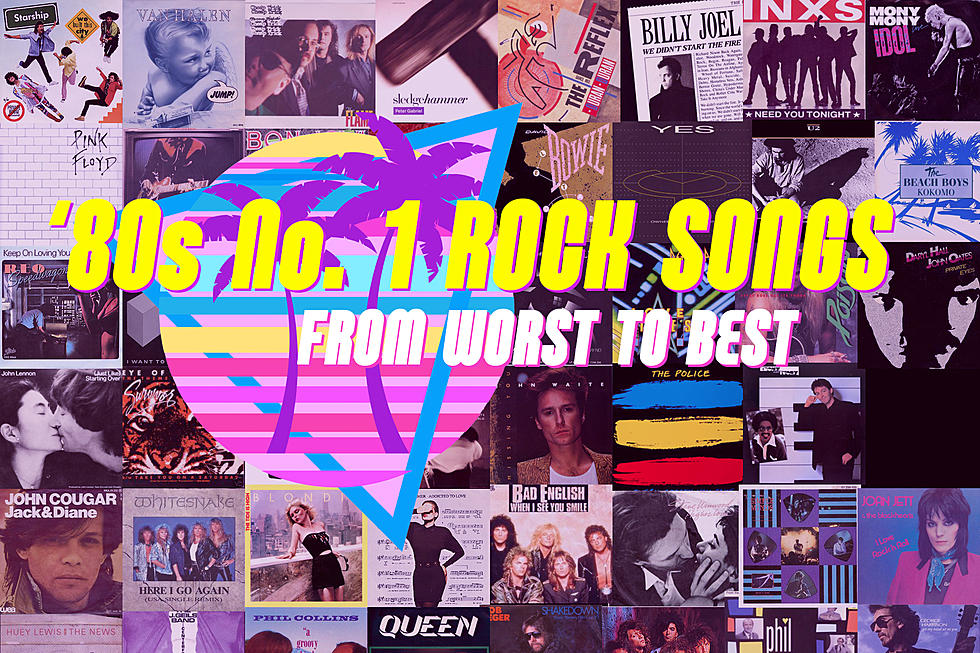
’80s No. 1 Rock Songs From Worst to Best
The '80s began with holdovers from the previous decade still holding sway, then quickly began to morph. Some of those first- and second-generation classic rockers adapted to an era defined by synthesizers, music videos and hairspray. But they were soon joined by new faces that bent and shaped pop and rock in a new image.
This winding musical journey played out at the top of the Billboard Hot 100. The following countdown of '80s No. 1 rock songs ranks them all from worst to best.
We're admittedly stretching the definition of "rock" with some of these chart-toppers. But in each case, they were singles by acts like Paul McCartney, Phil Collins, Heart and Chicago who have been credibly described as members of the classic rock genre – even if in the case of Starship, it's only through a loose association going back to Jefferson Airplane.
In some cases, these were career firsts. In others, they were career lasts. And some figures, like Collins, were simply inescapable. Every one of these singles represents a memorable signpost, both for the artists themselves and on the wider musical landscape. So much about the era is retold by these smash hits.
Which one was best? Here's our list of '80s No. 1 rock songs ranked from worst to best:
"We Are the World," USA for Africa (1985)
Weeks at No. 1: 4
Great sentiment, of course. But nobody is turning this up.
"We Built This City," Starship (1985)
Weeks at No. 1: 2
Told the premise of this song, singer Grace Slick said, "Oh, you're shitting me. That's the worst song ever!" She wasn't wrong.
"Ebony and Ivory," Paul McCartney and Stevie Wonder (1982)
Weeks at No. 1: 7
Great sentiment, of course. But nobody is turning this up.
"When I'm With You," Sheriff (1989)
Weeks at No. 1: 1
Still without a hit song and now flat broke, Arnold Lanni reportedly wrote this as a gift for his future wife. So basically, things went from bad to worse.
"A Groovy Kind of Love," Phil Collins (1988)
Weeks at No. 1: 2
In the first (but very much not the last) of his appearances on this list, Phil Collins transforms a fun Carole Bayer Sager-written hit by the Mindbenders into mind-numbingly boring soundtrack ballad.
"Every Rose Has Its Thorn," Poison (1988)
Weeks at No. 1: 3
Bret Michaels was at a Dallas laundromat when he found out his girlfriend was cheating on him. I'd rather watch his clothes dry than listen to this.
"Nothing’s Gonna Stop Us Now," Starship (1987)
Weeks at No. 1: 2
Somewhere, a white rabbit is uncontrollably weeping.
"Two Hearts," Phil Collins (1989)
Weeks at No. 1: 2
Thankfully, Lamont Dozier worked with brothers Brian and Eddie Holland back in the Motown days, rather than "Two Hearts" collaborator Phil Collins. His entire career might have been derailed.
"Can't Fight This Feeling," REO Speedwagon (1985)
Weeks at No. 1: 3
Sure you can. It's all about applying yourself.
"Separate Lives," Phil Collins and Marilyn Martin (1985)
Weeks at No. 1: 1
Songwriter Stephen Bishop lost the Oscar for Best Original Song to Lionel Richie's song "Say You, Say Me," another terrible song from White Nights film.
"The Flame," Cheap Trick (1988)
Weeks at No. 1: 2
Saddled with this song by his label, guitarist (and main songwriter) Rick Nielsen reportedly pulled the demo from a tape player and crushed it beneath his boot heel. If only that was the end of the story.
"Private Eyes," Daryl Hall and John Oates (1981)
Weeks at No. 1: 2
The worst song on their best album.
"These Dreams," Heart (1986)
Weeks at No. 1: 1
Nancy Wilson was suffering from a cold when she sang this, creating a more rough-hewn vocal. After "These Dreams" became their first No. 1 single, their new label reps at Capital reportedly asked: "Can't you just get sick again?"
"Stuck With You," Huey Lewis and the News (1986)
Weeks at No. 1: 3
One of those love songs that's not really a love song at all.
"We Didn't Start the Fire," Billy Joel (1989)
Weeks at No. 1: 2
Along the way, Nazis commit genocide, John F. Kennedy is murdered, and nuclear annihilation looms. Finally, he exclaims "I can't take it anymore!" – after referencing ... the cola wars?
"Kokomo," The Beach Boys (1988)
Weeks at No. 1: 1
What if you wrote a terrible Beach Boys pastiche and the Beach Boys actually performed it?
"Look Away," Chicago (1988)
Weeks at No. 1: 3
Cheap Trick had been offered the choice of either "The Flame" or "Look Away." They chose poorly.
"Bad Medicine," Bon Jovi (1988)
Weeks at No. 1: 2
In the video, comedian Sam Kinison hijacks the shoot in hopes of improving on the usual "slop that we get from these glam-rock pretty boys." Pity he couldn't have done that with the song, too.
"I Want to Know What Love Is," Foreigner (1985)
Weeks at No. 1: 2
Lou Gramm argued with bandmate Mick Jones over credit for this song, with Jones ultimately taking 100 percent. The best part is the New Jersey Mass Choir – and they got zero.
"I'll Be There for You," Bon Jovi (1989)
Weeks at No. 1: 1
Almost every song on New Jersey was too long, like Bon Jovi was trying to make glam prog. Even with a minute lopped off on the single version, "I'll Be There For You" overstays its welcome, too.
"Shakedown," Bob Seger (1987)
Weeks at No. 1: 1
He's a staple of classic rock playlists, but his singles weren't always that huge. ("Turn the Page," for instance, didn't chart at all.) So naturally, he finally topped the charts with a song that doesn't sound like Bob Seger at all.
"Alone," Heart (1987)
Weeks at No. 1: 3
You'll never convince me this isn't a Jim Steinman production.
"Here I Go Again," Whitesnake (1987)
Weeks at No. 1: 1
Ironically, the video for this glam-metal breakup song stars David Coverdale's future ex-wife Tawny Kitaen.
"Love Bites," Def Leppard (1988)
Weeks at No. 1: 1
Among other things.
"Another Day in Paradise," Phil Collins (1989)
Weeks at No. 1: 4
More proof that at this point, he could sing anything and have a hit – even lyrics that might be charitably described as painfully over-earnest.
"The Reflex," Duran Duran (1984)
Weeks at No. 1: 2
Remixer extraordinaire Nile Rodgers knew just what to do with Simon Lebon's annoying "why-yi-yi-yi": weaponize it for the dance floor.
"When I See You Smile," Bad English (1989)
Weeks at No. 1: 2
They were way better than this prefab song from an outside writer. Trying to match (or really, live down) this success proved to be the group's undoing.
"One More Night," Phil Collins (1985)
Weeks at No. 1: 2
Martin Scorsese used "One More Night" for the scene in The Color of Money where Tom Cruise impresses Paul Newman while hustling people at a pool table. Smart. The first single from No Jacket Required continued the sad-sack tone of Collins' recent divorce-themed songs, when the album was mostly filled with innocuous pop songs.
"St. Elmo's Fire (Man in Motion)," John Parr (1985)
Weeks at No. 1: 2
This is another one of those moments – looking at you, Chicago 16 – where producer David Foster brought in a bunch of ringers from Toto to ensure a hit. Unfortunately, Parr just isn't very interesting.
"Invisible Touch," Genesis (1986)
Weeks at No. 1: 1
Plasticine garbage, but just so hummable.
"Hard to Say I'm Sorry," Chicago (1982)
Weeks at No. 1: 2
Literally, more members of Toto appear on this song than members of Chicago.
"Amanda," Boston (1986)
Weeks at No. 1: 2
What if Boston played your high school prom?
"Jacob's Ladder," Huey Lewis and the News (1987)
Weeks at No. 1: 1
What if Huey Lewis and the News decided to get all serious?
"Maneater," Daryl Hall and John Oates (1982)
Weeks at No. 1: 4
John Oates' original demo had more of a reggae feel. Then Daryl Hall had the idea of ripping off the Supremes' No. 1 smash "You Can't Hurry Love."
"Heaven," Bryan Adams (1985)
Weeks at No. 1: 2
There's really not much going on here, then Steve Smith does one of his patented Journey drum fills. Then, not much starts going on again.
"Against All Odds (Take a Look at Me Now)," Phil Collins (1984)
Weeks at No. 1: 3
He almost – but not quite – saves it with some "In the Air Tonight"-style drumming.
"Eye of the Tiger," Survivor (1982)
Weeks at No. 1: 6
Sylvester Stallone wanted to use "Another One Bites the Dust" in Rocky III, but Queen said no. So this is totally Queen's fault.
"Footloose," Kenny Loggins (1984)
Weeks at No. 1: 3
This sounded so instantly familiar because it's built on a foundation from rock's early era. Opening riff: Duane Eddy's "Rebel Rouser." Bass line: Little Richard's "Good Golly Miss Molly." Tempo: Chuck Berry's "Johnny B. Goode." In fact, "Footloose" was so overstuffed with ideas that they had to link four 24-track tape decks together to complete the song.
"Sussudio," Phil Collins (1985)
Weeks at No. 2: 1
More plasticine garbage. But also, so hummable.
"Mony Mony," Billy Idol (1987)
Weeks at No. 1: 1
Two consecutive covers of Tommy James and the Shondells songs somehow went to No. 1 in 1987, beginning with Tiffany's gooey version of "I Think We're Alone Now." Stick with this one.
"The Tide Is High," Blondie (1981)
Weeks at No. 1: 1
Debbie Harry apparently wanted to record this cover with the Specials as the their career began to fade. The British ska revivalists stupidly turned her down, and never scored a Hot 100 hit.
"Tell Her About It," Billy Joel (1983)
Weeks at No. 1: 1
Pproducer Phil Ramone hit No. 1 the week before with Michael Sembello's "Maniac," and that provides important perspective when trying to sort out why this well-meaning Motown tribute felt so plastic.
"Say Say Say," Paul McCartney and Michael Jackson (1983)
Weeks at No. 1: 6
The video, where these two play hucksters, felt revealing. They knew this was rubbish, and that you'd buy it anyway.
"Abracadabra," Steve Miller Band (1982)
Weeks at No. 1: 2
He was reportedly touring overseas when the video for this synthy ploy for an '80s hit was shot, and so doesn't appear. How fitting.
"Livin' on a Prayer," Bon Jovi (1987)
Weeks at No. 1: 4
Basically a parody of Bruce Springsteen, but with a talk box.
"Rapture," Blondie (1981)
Weeks at No. 1: 2
That trash disco beat is so great that you can forgive a weird rap about a man from Mars and his healthy appetite for cars, guitars and, well, you.
"Addicted to Love," Robert Palmer (1986)
Weeks at No. 1: 1
Model Kathy Davies, seen here miming the drums, later admitted that she spent most of this shoot simply staring at Robert Palmer's ass.
"Out of Touch," Daryl Hall and John Oates (1984)
Weeks at No. 1: 2
Everything sounded like this in 1984, so they joined in. Kind of like the way they finally learned to play that giant drum.
"Roll With It," Steve Winwood (1988)
Weeks at No. 1: 4
He was trying a little too hard to make something that had the chicken-fried grit of Jr. Walker and the All Stars' "(I'm a) Road Runner." Composers Holland-Dozier-Holland ended up getting retroactive co-writing credits for "Roll With It," too.
"La Bamba," Los Lobos (1987)
Weeks at No. 1: 3
They'd grow into something else entirely, but Los Lobos was once simply a ubiquitous local wedding band. You can hear echoes of that in their straight-forward professionalism with this cover. The original has way more fire.
"Keep On Loving You," REO Speedwagon (1981)
Weeks at No. 1: 1
That chorus is so big that they never even get around to a second verse.
"It's Still Rock and Roll to Me," Billy Joel (1980)
Weeks at No. 1: 2
So, to recap: Billy Joel says he won't change his style to fit the times, actually adapts his style to fit the times, and earns his first No. 1 single.
"A View to a Kill," Duran Duran (1985)
Weeks at No. 1: 2
This band had split into two camps for a while, forming Power Station and Arcadia. When they got back together, Duran Duran suddenly sounded like the Power Station – only not as good.
"Coming Up (Live at Glasgow)," Paul McCartney (1980)
Weeks at No. 1: 3
Paul McCartney put out two self-titled solo recordings. Both of them produced Top 10 hits, but only after the songs were performed live by Wings.
"You Give Love a Bad Name," Bon Jovi (1986)
Weeks at No. 1: 1
The whole glam-metal thing? It starts right here.
"The Power of Love," Huey Lewis and the News (1985)
Weeks at No. 1: 2
Chris Hayes opens his guitar solo with a bend clearly swiped from their opening act, Stevie Ray Vaughan.
"Centerfold," The J. Geils Band (1982)
Weeks at No. 1: 6
Before this, main songwriter Seth Justman said the J. Geils Band never employed synths because they couldn't afford to buy one. The belated purchase really paid off.
"Got My Mind Set on You," George Harrison (1988)
Weeks at No. 1: 1
George Harrison actually came to America before the Beatles did, stopping in to see his older sister in 1963 at her home outside St. Louis. One of the albums he bought during this visit included James Ray's cover of "Got My Mind Set On You" by Rudy Clark.
"Shout," Tears for Fears (1985)
Weeks at No. 1: 3
This non-specific protest song clearly had one very specific goal: Filling dance floors. It's basically just the same hook, over and over and over again.
"Kiss on My List," Daryl Hall and John Oates (1981)
Weeks at No. 1: 3
Hall and Oates created a demo of this song for as a guide for its co-writer, once an aspiring pop star. Then label execs insisted the rough draft of "Kiss On My List" appear on Voices. They were right.
"Missing You," John Waite (1984)
Weeks at No. 1: 1
"Missing You" knocked "What's Love Got to Do With It" out of the No. 1 slot, but Tina Turner clearly had no hard feelings. She later covered it.
"Africa," Toto (1983)
Weeks at No. 1: 1
Kilimanjaro is nowhere near the Serengeti, but "Africa" is an idea song, not a travelogue. Its deep sense of yearning has helped Toto transcend decades of unfair mockery. And that rhythm track, of course.
"Crazy Little Thing Called Love," Queen (1980)
Weeks at No. 1: 4
Freddie Mercury, whose rudimentary guitar work formed the basic track, later admitted that "Crazy Little Thing Called Love" was "not typical of my work, but that's because nothing is typical of my work." Another genre left turn for Queen provided their first American chart-topper.
"I Love Rock 'n' Roll," Joan Jett and the Blackhearts (1982)
Weeks at No. 1: 7
All the best covers offer new perspective on a familiar song. This is certainly one of those.
"Sweet Child o' Mine," Guns N' Roses (1988)
Weeks at No. 1: 2
The first No. 1 listed on the first publication of the Billboard Hot 100 was "Poor Little Fool," a song written by Sharon Sheeley about Don Everly of the Everly Brothers. Some 30 years later, the No. 1 song on the Hot 100 was "Sweet Child o' Mine," a song about Don's daughter, Erin Everly.
"Jump," Van Halen (1984)
Weeks at No. 1: 5
For the song, Eddie Van Halen's fat keyboard riff carries the song in a way David Lee Roth's vocals never could. But the video, set on a bare stage and with utterly no plot, would be nothing without Roth's cheeky stage presence.
"Jack & Diane," John Mellencamp (1982)
Weeks at No. 1: 4
Taking his cue from "In the Air Tonight," John Mellencamp asked his drummer for a huge drum break. Kenny Aronoff had been in the breakroom, worrying over his job security since the song otherwise employs a then-new Linn LM-1 drum machine.
"Need You Tonight," INXS (1988)
Weeks at No. 1: 1
Andrew Farriss was heading out for a flight to meet Michael Hutchence for a writing session when this riff came to him. He ran back into the house to make a quick recording while the cab driver waited. Hope he got an incredible tip.
"Higher Love," Steve Winwood (1986)
Weeks at No. 1: 1
Steve Winwood wasn't a new face, but this setting (call it Beer Commercial Yuppie Blues Rock) certainly was – and for a little while, Winwood was its complete personification.
"Call Me," Blondie (1980)
Weeks at No. 1: 6
Screenwriter Paul Schrader showed Debbie Harry a rough cut of American Gigolo as a form of inspiration. She'd completely inhabit the glitzy salaciousness that surrounds our introduction to Richard Gere's character, kicking off the '80s in style.
"I Still Haven't Found What I’m Looking For," U2 (1987)
Weeks at No. 1: 2
"I Still Haven't Found What I'm Looking For" was a song of great wonder and curiosity, delivered just before U2's interest in Americana devolved into fetish. Soon, they'd be found on stage using Harlem's New Voices of Freedom choir as a Foreigner-esque prop.
"I Can't Go for That (No Can Do)," Daryl Hall and John Oates (1982)
Weeks at No. 1: 1
Daryl Hall ran into Michael Jackson a few years later at the session for "We Are the World." "He came up," Hall said in a radio interview, "and he said, 'Hey, man, I hope you're okay with that. You know, I stole 'No Can Do' for 'Billie Jean.'"
"Owner of a Lonely Heart," Yes (1983)
Weeks at No. 1: 2
Trevor Horn used an uncleared sample of a drum breakdown from "Kool Is Back" from an obscure group called Funk Inc. to give this song its initial propulsion. Then Yes looked on "Owner of a Lonely Heart" sampled about a million times. Kismet.
"(Just Like) Starting Over," John Lennon (1980)
Weeks at No. 1: 5
"(Just Like) Starting Over" was already on the charts when a deranged fan shot John Lennon in the back. A song of renewal became something else entirely: the fourth posthumous song to hit No. 1 on the Hot 100.
"Money for Nothing," Dire Straits (1985)
Weeks at No. 1: 3
So a song complaining about MTV and posh rock stars becomes the best-known promo for MTV with a guest appearance by a posh rock star. Got it.
"Let's Dance," David Bowie (1983)
Weeks at No. 1: 1
Nothing about this triumph makes sense, not David Bowie working with Nile Rodgers of Chic game, not Stevie Ray Vaughan providing a scorching solo, and definitely not Bowie miming that solo where white gloves.
"Everybody Wants to Rule the World," Tears for Fears (1985)
Weeks at No. 1: 2
Like "Shout," this song lets you fill in your own blanks when it comes to meaning. Unlike "Shout," "Everybody Wants to Rule the World" is sneaky great, revealing itself in miniature where Tears for Fears once clubbed you over the head.
"Another One Bites the Dust," Queen (1980)
Weeks at No. 1: 3
Queen clearly took inspiration from Chic's "Good Times" then saw "Another One Bites the Dust" take over No. 1 from "Upside Down" the Diana Ross single written and produced by Chic's Nile Rodgers and Bernard Edwards.
"Don't You (Forget About Me)," Simple Minds (1985)
Weeks at No. 1: 1
It took a long time to convince Simple Minds to record this cover song for a soundtrack, and even once they'd finally agreed, Jim Kerr wanted to do some work on the lyrics. He sang "la-la-la" through the outro as a placeholder, hoping to improve on things later. But producer Keith Forsey released "Don't You (Forget About Me)" as is.
"With or Without You," U2 (1987)
Weeks at No. 1: 3
What if you could make a power ballad that didn't suck?
"Another Brick in the Wall (Part II)," Pink Floyd (1980)
Weeks at No. 1: 4
Producer Bob Ezrin re-used his kid's choir idea from "School's Out" on a song about how much school sucks that has none of Alice Cooper's humor. What the admittedly dour smash hit had instead was a disco beat entirely in keeping with the times, and an unforgettably flinty David Gilmour solo.
"Sledgehammer," Peter Gabriel (1986)
Weeks at No. 1: 1
Peter Gabriel has said he was inspired to go into music after seeing Otis Redding. He's also said he meant to pay tribute to his brand of '60s soul on "Sledgehammer," which also featured Redding collaborator Wayne Jackson on trumpet. But the jittery, Fairlight playing Gabriel was no R&B shouter, and that's what gives this song its modern dance-floor tension.
"Every Breath You Take," The Police (1983)
Weeks at No. 1: 8
Another one of those love songs that's not really a love song at all. Sting strung together the creeper lyrics while at James Bond creator Ian Fleming's desk during a vacation at the Goldeneye estate in Jamaica. Andy Summers then added these shimmering, gorgeously echoed guitar lines, tricking a whole bunch of new brides and prom queens into making this their first dance.
33 Rock Star Mug Shots
Gallery Credit: Nick DeRiso
They Hated Their Own Albums
More From Ultimate Classic Rock
